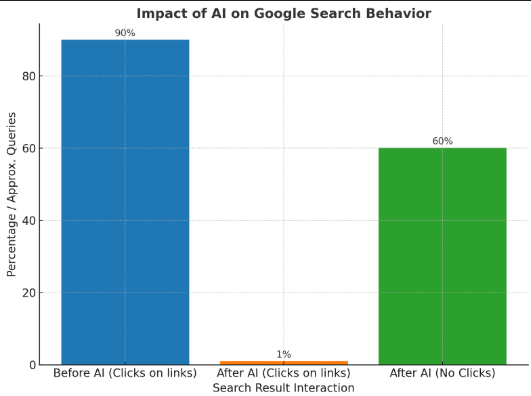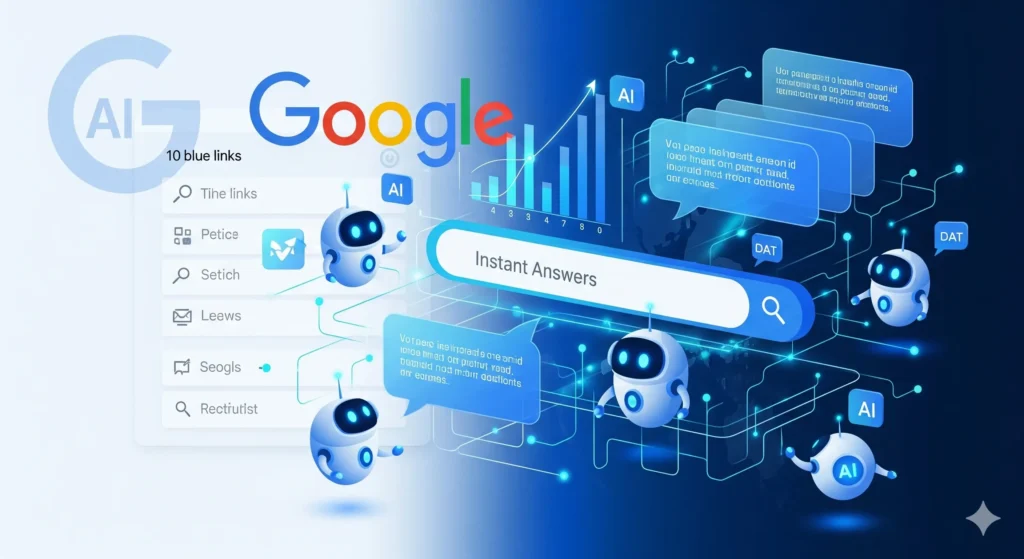Remember searching on Google before 2023? You typed in a query and got ten blue links—maybe a thousand more if you dared to click page two. You scrolled through, read the articles, and pieced together the answers yourself. It took time, but you understood what you were reading.
That internet is fading fast. And what’s taking its place? AI overviews—instant answers by artificial intelligence. No need to click, no need to scroll, just a summary delivered to you in seconds. For the first time in decades, this has left Google in a dilemma.
It has long been the king of search, holding nearly 90% of global queries. So much so that “Googling” became a verb. Yet AI is changing that, pushing Google into an identity crisis. Its response? Betting big on the same artificial intelligence that disrupted it.
From Traditional SEO to an AI-Driven Search World
How Google Search Used to Work
Traditional Google search relied on ranking websites based on:
- Keywords
- Backlinks
- A sprinkle of SEO (Search Engine Optimization)
SEO was the art of making your website show up on Google. Businesses invested heavily in it. But that model is eroding, because you don’t even need to click a link anymore—AI provides the answer upfront.
The “One in 100” Problem
A new study shows users now click on links just once in every 100 queries. The rest of the time, they simply read the AI summary. Top websites have lost nearly 80% of their traffic as a result.

Google’s AI Pivot
AI Overviews (Launched May 2024)
Summarizes your query in seconds—almost like meeting notes.
AI Mode
Breaks complex queries into simple answers, complete with images, videos, and follow-up questions—like a personal assistant.
Web Companion
Clusters results into categories. Example: searching “solo trip to Argentina” may yield groups like safety tips, blogs, budget hacks, and visa rules. Google becomes the librarian, organizing knowledge for you.
The Rise of No-Click Searches
- By 2024, nearly 60% of Google searches ended in no clicks.
- Users got what they needed instantly through AI summaries.
- For Google, that’s efficiency. For websites, it’s a slow death.
This isn’t just about losing visitors—it’s also about losing revenue and relevance.
The Consumer Trade-Offs
Accuracy Concerns
AI isn’t flawless. It can hallucinate, distort sources, or provide incomplete information.
Bias and Prioritization
AI often prioritizes content owned by Google’s parent company (Alphabet/ABC). For instance, YouTube videos may get preference over independent sources.
The Loss of Serendipity
Old search methods allowed for discovery—you could stumble upon new perspectives while browsing. AI summaries, while efficient, reduce exploration and deep learning.
Google’s Business Dilemma
- In 2024, Google earned over $260 billion from ads.
- AI summaries disrupt this model by bypassing clicks.
- Still, Google is deliberately sacrificing short-term ad revenue to stay relevant in the AI race.
In short: Google would rather reinvent search than be overtaken by another platform.
Adapting to the New Search Era
1. Move Beyond Keywords
Focus on topical authority. Create comprehensive, trustworthy content that AI will reference in its summaries.
2. Optimize for AI Understanding
Use clear language, structure, and accurate data. AI favors well-organized, fact-based content.
3. Diversify Traffic Sources
Don’t rely solely on Google organic traffic. Use:
- Social media marketing
- Newsletters
- Direct audience engagement
4. Build Brand Loyalty
Create communities and encourage direct connections. Reduce dependence on Google for visibility.
Conclusion: The Evolution, Not the End, of Search
Google Search as we knew it is changing—but search itself is not dying. Instead, it’s being reimagined by Google with AI at its core.



